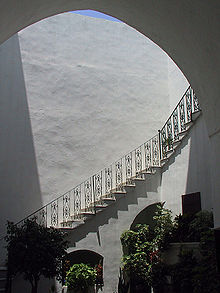Holy book

The Most Holy Book or Aqdas ( Arabic الكتاب الأقدس al-Kitab al-Aqdas , DMG al-Kitab al-Aqdas ; although Arabic it is better known by its Persian nameكتاب اقدس Ketab-e Aghdas , DMG Ketāb-e Aqdas , Baha'i transcription Kitáb-i-Aqdas ) is a holy book completed in1873 by Baha'ullah in Akkon . It occupiesa prominent positionin the Baha'i canon and deals with a wide range of topics. These include ethics , rituals , a basic church order, the foundations of a future world society , appeals to the rulers of the world and much more. Although the name of the book of laws is common, it is rather a framework of more spiritual than legalistic oriented religion of the Bahai.
content
The book describes the framework of a world culture prophesied by Baha'ullah, entrusts his successor ʿAbdul-Baha 'with the task of interpretation and gives instructions for the development of the community order, within which the commandments of the book are applied according to the needs of the time and where necessary should be expanded.
Baha'ullah prescribes the compulsory prayers in the Most Holy Book , sets the time for fasting , forbids - with the exception of the prayer for the dead - the community prayer , determines the direction of prayer and the social contributions , formulates the right of inheritance , decrees the nineteen-day celebrations, the Baha'i public holidays, the inserted days in the Baha'i calendar and the Mashriqu'l-Adhkar . This refers to houses of prayer that are to be expanded into centers over time, around which facilities such as old people's homes, orphanages, schools and hospitals will be arranged. He creates the state of the clergy ( clergy ) from proclaims the spiritual maturity of each individual person, overcoming discord and the unity of the sexes and races, prohibits slavery , asceticism , mendicancy , monasticism , the confession , the use of pulpits and the Kissing Hand , prescribes monogamy , condemns cruelty to animals , idleness and laziness , defamation and defamation , disapproves of divorce , forbids gambling , the consumption of opium , wine and other intoxicating beverages. It determines the punishments for the willful homicide , arson , adultery and theft in a future society. It emphasizes the importance of marriage and regulates its legal basis. He obliges everyone to pursue a trade or other profession and elevates such work to the rank of worship . He stressed the need to raise the necessary means for education and ordered everyone to make a will and obey the laws of the country in which one lives.
In addition, Baha'ullah exhorts his followers to maintain cordial and amicable fellowship with the believers of all religions without distinction. He warns them against fanaticism , turmoil , pride , argument and righteousness and demands of them immaculate purity, unconditional truthfulness , spotless chastity , trustworthiness , hospitality , loyalty , courtesy , patience and justice .
In the Most Holy Book, Baha'ullah also warns the most important kings and rulers of his time (Emperor Napoleon III of France , Emperor Wilhelm I of the German Empire , Emperor Franz Joseph I of Austria-Hungary and the governments of America) against arrogance and tyranny and encourages them to “listen to the voice of God” and heed his call. He speaks of war and the fall of their empires if they should not heed his admonition and prophesies that the “reins of power will pass into the hands of the people”.
He calls on the spiritual leaders of the world religions not to examine his revelation according to their self-conceived standards and not to shut people out of it through self-righteous behavior.
The Most Holy Book is supplemented by a “Questions and Answers” chapter in the Baha'i editions, which contains 107 questions regarding the application of the religious laws and the corresponding answers of Baha'ullah, as well as extensive explanations from the Baha'i World Center .
literature
Editions of the Most Holy Book
- Bahá'u'lláh: The Kitáb-i-Aqdas. The holiest book . Bahá'í-Verlag, Hofheim 2000, ISBN 3-87037-339-3 ( online ).
- Bahá'u'lláh: The Kitáb-i-Aqdas . US Bahá'í Publishing Trust, Wilmette 1993, ISBN 0-87743-240-6 ( online ).
Secondary literature
German
- Aspects of the Kitáb-i-Aqdas . In: Society for Bahá'í Studies for German-speaking Europe (Hrsg.): Series of publications by the Society for Bahá'í Studies . tape 2 . Bahá'í-Verlag, Hofheim 1995, ISBN 3-87037-312-1 .
- Udo Schaefer: Freedom and its barriers. On the concept of freedom in Bahá'u'lláh's Kitáb-i-Aqdas . Bahá'í-Verlag, Hofheim 1994, ISBN 3-87037-305-9 .
- Adib Taherzadeh: `Akká, the first years 1868–1877 . In: The Revelation of Bahá'u'lláh . tape 3 . Bahá'í-Verlag, Hofheim 1992, ISBN 3-87037-295-8 , pp. 327-471 .
English
- Baharieh Rouhani Ma'ani, Sovaida Ma'ani Ewing: The Laws of the Kitáb-i-Aqdas . George Ronald Publisher, Oxford 2004, ISBN 978-0-85398-475-7 .
- Nader Saiedi : Logos and Civilization. Spirit, History and Order in the Writings of Bahá'u'lláh . University Press of Maryland, Bethesda 2000, ISBN 1-883053-63-3 , III. The New World Order, p. 211-370 .
- Cyrus Alai: Kitáb-i-Aqdas as Described and Glorified by Shoghi Effendi . In: 'Irfán Colloquia, Iraj Ayman (Ed.): Lights of' Irfán. Papers Presented at the 'Irfán Colloquia and Seminars . tape 1 . Bahá'í Distribution Service, Wilmette 2000, p. 21-30 .
- John Hatcher, William S. Hatcher : The Law of Love Enshrined . George Ronald Publisher, Oxford 1995, ISBN 978-0-85398-405-4 .
- Suheil Bushrui: The style of the Kitáb-i-Aqdas. Aspects of the sublime . University Press of Maryland, Bethesda 1995, ISBN 1-883053-08-0 .
- Martha L. Schweitz: The Kitáb-i-Aqdas. Bahá'í Law, Legitimacy, and World Order . In: Association for Bahá'í Studies - North America (Ed.): Journal of Bahá'í Studies . tape 6.1 , 1994 ( online [PDF; 71 kB ]).
Web links
- theaqdas.org , English language study aid for Kitab-i-Aqdas by Borna Safai
- Website of the Bahá'í Publishing House